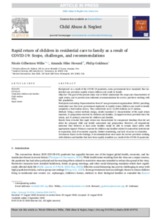Abstract
Background
As a result of the COVID-19 pandemic, some governments have mandated that residential care providers rapidly return children and youth to family.
Objective
The goal of the present study was to better understand the scope and characteristics of rapid return, and to provide data-informed recommendations for service providers working with this population.
Participants and setting
Representatives from 67 non-government organizations (NGOs) providing residential care that were government-mandated to rapidly return children and youth to family completed a brief online survey. They collectively serve 12,494 children in 14 nations.
Methods
Using a mixed methods design, results examined 1) characteristics of the rapid return mandate, 2) preparation received by children and families, 3) support services provided since the return, and 4) primary concerns for children and families.
Results
Data revealed that rapid return was characterized by compressed timelines that did not allow for adequate child and family assessment and preparation. However, all respondents indicated they believed at least some families would be able to remain intact safely with appropriate support. Primary concerns for children and families related to unresolved antecedents to separation, lack of economic capacity, limited monitoring, and lack of access to education.
Conclusions
Based on the findings, 9 recommendations were made for service providers working with children and families that have been rapidly reunified as a result of the COVID-19 pandemic.
View the accompanying infographic and other materials from CAFO here.

